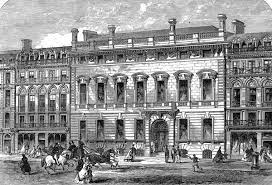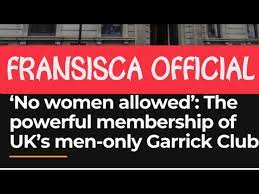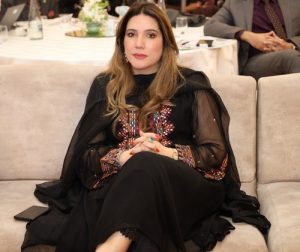‘No women allowed’: The powerful membership of UK’s men-only Garrick Club

London: Calls for public servants and others to quit the Garrick Club have mounted as critics question the judgement of powerful men paying an annual membership fee of about 1,000 British pounds (approximately $1,260) to join an exclusionist club that actively blocks the admission of women.
Now, the row has reached boiling point on London’s social scene, with the head of MI6, Richard Moore, and the head of the civil service, Simon Case, as well as four senior judges all announcing their resignations from the men-only watering hole in the past few days.
Situated in the heart of “Theatreland” in London’s West End, the Garrick Club was founded in 1831 under the patronage of Augustus Frederick, the Duke of Sussex and brother of King George IV, to honour the 18th-century actor, David Garrick, who the club considers one of the “greatest actors of his time”.

Established to bring together “men of refinement and education” in a dining and social club setting, the Garrick is believed to have a waiting list of approximately 10 years for the admission of new male members.
Its first members, the club notes, were “a sophisticated and cosmopolitan group that included twenty-four peers of the realm as well as writers, actors, musicians and publishers”.
Then, as now, Garrick membership is open to male elites only and the club appears committed to its traditions.
“Overwhelmingly white and predominately elderly,” the UK’s Guardian newspaper reported, after recently obtaining the full list of the Garrick’s current approximately 1,500 members.
According to the Guardian, alongside senior politicians, judges, businessmen and academics, three bishops and 14 reverends are members, as was the head of the UK’s MI6 intelligence service, Richard Moore, and the cabinet secretary, Simon Case, the most senior adviser to Prime Minister Rishi Sunak, until just a few days ago.
Well-known actors rank among the Garrick’s star members, including Hugh Laurie, Stephen Fry, Benedict Cumberbatch, and Succession co-stars Brian Cox and Matthew Macfadyen.
In the worlds of media, fashion, music and sport, members include the BBC’s world affairs correspondent John Simpson; the Daily Mail’s former editor Paul Dacre; fashion designer Paul Smith, Dire Straits lead singer Mark Knopfler, and English league manager Roy Hodgson, the Guardian reports.
An attempt by British actress Joanna Lumley to join the Garrick in 2011 – after she was nominated for membership by fellow actor Hugh Bonneville – led the club to seek legal advice on the matter. She was not admitted.
In 2015, a vote of Garrick members found that 50.5 percent were in favour of women joining as members – a slim majority but a number that fell far short of a two-thirds majority required to push a change in the club’s rules.
A more recent poll of members in late 2023 found that 51 percent of those who participated in the survey indicated that they were in favour of female members while 44 percent were against and 4 percent were undecided.
The Garrick, and other private clubs, maintain a right under the UK’s 2010 Equality Act to enforce single-sex membership rules. The private status of such clubs exempts them from sanction under the Human Rights Act.
In February, a 40-year patron of the Garrick Club reportedly had his membership removed for vocally advocating for the admission of women members.
Colin Brough was deemed to have engaged in “conduct unbecoming of a gentlemen” of the Garrick Club for his activism on behalf of female membership, which included sending emails to fellow club members in which he expressed his views, according to a report.
Brough was reported to have described the Garrick as having a “Putin-style” management and accused the club of blocking the will of a majority of members who favoured allowing women to join.
While women can enter the Garrick Club as guests of a male member, some areas within the building are off-limits and reserved for members only.
The Garrick states that members and their guests must “abide by the traditions and rules of the club”, including a dress code: jackets, shirts and ties worn at all times by men when lunching or dining, while “ladies may wear trousers but not jeans”.
Visitors are also not “permitted to pay for anything whatsoever”, according to the club’s website.
Jemima Olchawski, chief executive of the Fawcett Society, which champions women’s equality and gender rights in the UK, questioned why some of the most influential men in British society continued to remain members of a sexist club.
“There is no place for the overt sexism and misogyny of the Garrick Club’s membership policy in the 21st century,” Olchawksi told Al Jazeera.
“We talk about the establishment as an old boys’ club and this is literally a club for boys,” Olchawski said.
“We have a big issue with inequality in our society – we have a gaping gender pay gap, we have women locked out of the workforce, and there are too few women in positions of power in government and business. Toxic policies that actively exclude women are regressive and the senior, influential men who support them should be ashamed of themselves,” she added.

